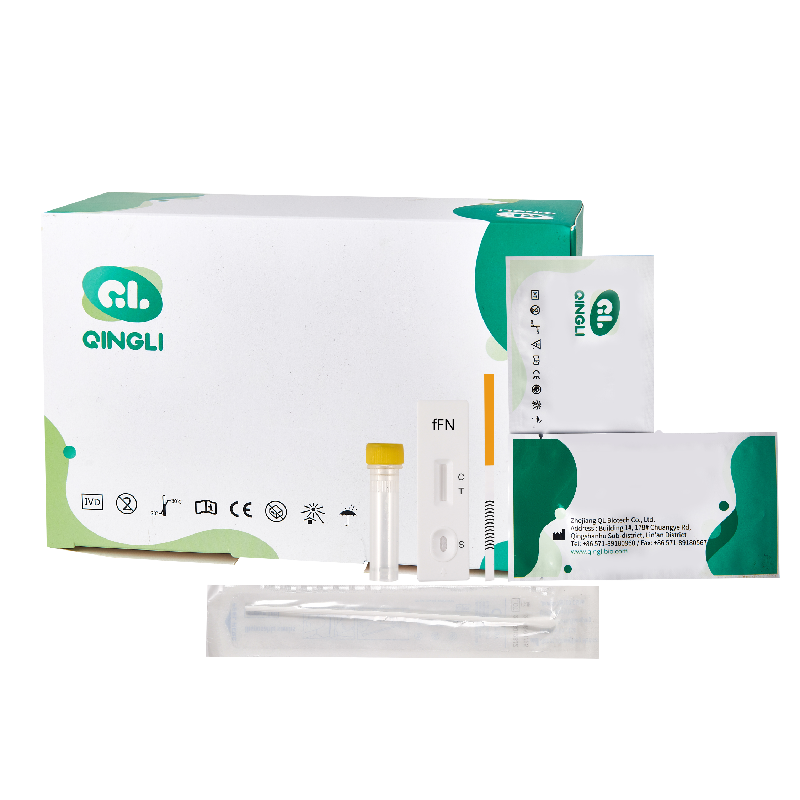Supplier Fetal Fibronectin Rapid Test Device/Strip
Product Main Parameters
| Product Name | Supplier Fetal Fibronectin Rapid Test |
|---|---|
| Used for | For professional in vitro diagnostic use only |
| Specimen | Vaginal secretion |
| Packing | 20 tests/box, 1 test/polybag |
| Storage Temperature | 2‐30°C |
| MOQ | 1000 tests |
| Cooperation Modes | OEM/ODM |
Common Product Specifications
| Detection Window | 22-34 weeks of gestation |
|---|---|
| Result Time | Within 1 hour |
| Method | Immunochromatographic |
| Sensitivity | High |
| Specificity | High |
Product Manufacturing Process
Based on extensive research and development within the IVD industry, the manufacturing process of our supplier fetal fibronectin rapid test involves rigorous quality control measures to ensure accurate and reliable results. The devices are produced in a sterile environment, adhering to international standards. Our dedicated R&D team continuously evaluates and enhances the production methodologies to incorporate the latest scientific advancements. The implementation of advanced immunochromatographic techniques ensures high sensitivity and specificity in detecting fetal fibronectin levels, crucial for assessing preterm birth risk. As a result, our product stands out in clinical accuracy and reliability, enabling healthcare providers to make informed decisions.
Product Application Scenarios
The supplier fetal fibronectin rapid test is primarily used in obstetric care settings to evaluate the risk of preterm birth. Given the significant health implications of preterm delivery, timely assessment allows for strategic interventions that can enhance neonatal outcomes. The test is performed by collecting vaginal secretions from pregnant women between 22 to 34 weeks of gestation. A positive result indicates a higher risk of preterm labor, guiding healthcare providers to consider interventions such as corticosteroids or hospital transfer. A negative result offers reassurance and helps in reducing unnecessary medical interventions. The test aids in personalized prenatal care, optimizing maternal and fetal health.
Product After-Sales Service
We offer comprehensive after-sales support to our clients, ensuring satisfaction with our supplier fetal fibronectin rapid test devices. This includes technical assistance, troubleshooting guidance, and prompt response to inquiries. Our customer service team is dedicated to addressing any concerns related to product functionality or usage. Clients can also access detailed product documentation and user manuals. Regular follow-ups and feedback collection help us improve our products and services.
Product Transportation
Our supplier fetal fibronectin rapid tests are carefully packaged to maintain product integrity during transit. We collaborate with reliable logistics partners to ensure timely and safe delivery. The packages are labeled appropriately, detailing storage instructions to preserve product efficacy. Customers can track their shipments and receive real-time updates on delivery status. Our commitment to efficient logistics supports seamless product distribution worldwide.
Product Advantages
- Non-invasive and easy to administer
- High sensitivity and specificity
- Quick results within an hour
- Helps reduce unnecessary interventions
- Supports informed clinical decisions
- Produced under stringent quality control standards
- Available in various packaging options
- Backed by experienced technical support
- OEM/ODM cooperation options available
- Effective risk management tool in prenatal care
Product FAQ
- What is the primary use of the fetal fibronectin rapid test? The supplier fetal fibronectin rapid test is used to assess the risk of preterm birth in pregnant women, enabling timely interventions.
- How is the sample collected for the test? A healthcare provider collects a sample of vaginal secretions using a swab for analysis.
- What does a positive test result indicate? A positive result indicates the presence of fetal fibronectin, suggesting a higher risk of preterm labor.
- What does a negative test result mean? A negative result strongly indicates that preterm labor is unlikely to occur within the next two weeks.
- Can the test be performed at home? No, the test is intended for professional use in clinical settings only.
- Are there any factors that can affect test results? Yes, factors such as recent cervical examination or vaginal infections may influence results.
- How should the tests be stored? The tests should be stored at a temperature of 2‐30°C.
- What is the minimum order quantity? The minimum order quantity for our supplier fetal fibronectin rapid tests is 1000 tests.
- Is technical support available for the product? Yes, we offer comprehensive technical assistance and customer support for our products.
- What are the packaging options available? The tests are available in packaging of 20 tests/box, with each test in a polybag.
Product Hot Topics
- Discussion on the importance of fetal fibronectin testing in prenatal care The supplier fetal fibronectin rapid test plays a crucial role in modern obstetrics by offering a reliable method to assess the risk of preterm birth. With preterm deliveries posing significant health risks, this test empowers healthcare providers to initiate timely interventions, enhancing neonatal outcomes. By reducing unnecessary medical procedures for low-risk pregnancies, the test supports effective resource allocation. Moreover, its non-invasive nature and quick results make it a favored choice in clinical settings. The advancements in fetal fibronectin testing underscore its growing importance in personalized prenatal care strategies.
- Debate on the accuracy and reliability of fetal fibronectin rapid tests The accuracy of fetal fibronectin rapid tests is often debated among healthcare professionals. As a supplier, we emphasize the high sensitivity and specificity of our rapid test devices, supported by rigorous quality control measures during manufacturing. While external factors can impact results, the test remains a valuable risk management tool when used in conjunction with clinical assessments. The evolving methodologies in the IVD industry continue to improve test reliability, making it an integral component of preterm birth risk assessment protocols. Understanding its limitations and proper use is crucial for optimizing patient outcomes.
Image Description
There is no picture description for this product


